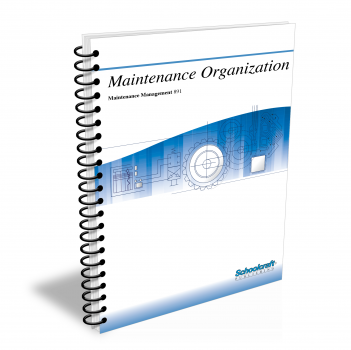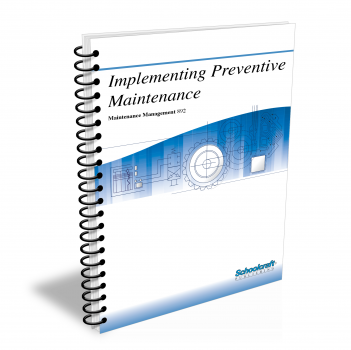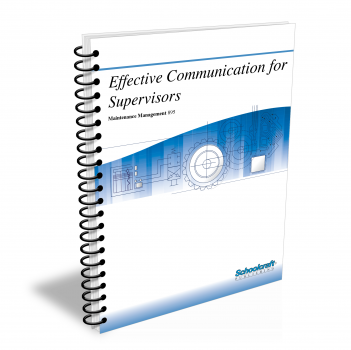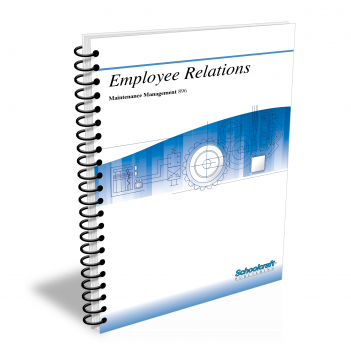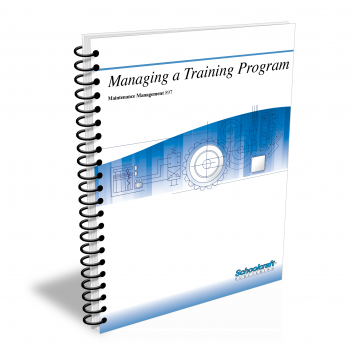Improving Performance in Maintenance
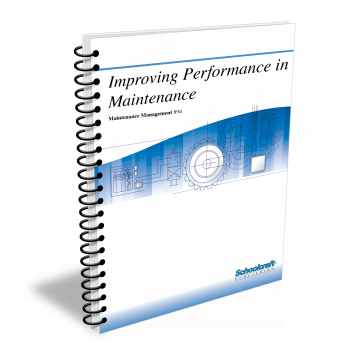
Course Number: 894
The Improving Performance in Maintenance textbook covers instructions to first-line supervisor in the strategies involved in improving performances, and presents proven methods for increasing maintenance productivity. Develops ways of evaluating training effectiveness and the management of time. Describes the information necessary to stimulate improvement in all facets of the maintenance program.
Does your curriculum require additional topics not included in this textbook? Build a customized version of the Improving Performance in Maintenance textbook below.
Recommended Contact Hours – 10
Preview a Chapter
Available Supporting Material
- Table of Contents
- Exam Copies
- Suggested Titles
Table of Contents
Chapter 1: Evaluating Performance
Topics: Determining areas of responsibility; Measures of performance; Utilizing labor; Measuring material use; Control practices; Supervisory practices; Hourly activity patterns; Controlling costs; Controlling personnel; Reading performance trends; Reports to keep weekly; Reports to keep monthly; Measuring performance
Learning Objectives:
- Give examples of the different interest levels of key maintenance personnel.
- Compute annual productive hours per worker.
- Compute costs per productive hour.
- List indicators that can help a supervisor control costs.
- Tell how performance trends are established.
Chapter 2: Increasing Productivity
Topics: Factors affecting productivity; Improving labor use; The technique of work sampling; Random sampling; Conducting work sampling; Observation periods; Tabulating results
Learning Objectives:
- List factors that adversely affect maintenance labor utilization.
- List factors that have an adverse effect on maintenance labor effectiveness.
- Describe the role of the supervisor in improving labor productivity.
- State how and why random sampling and work sampling are conducted.
Chapter 3: Effects of Training
Topics: The supervisor's role in training; Training workers from multicraft crews; Safety training; Apprentice training; Creating the environment for learning; Conducting effective training; Motivating crew members during training; Enhancing the learning process; Using competition wisely; Avoiding elements that slow learning; Successful training requires a plan
Learning Objectives:
- Describe the first-line supervisor's role in training crew members.
- List the various forms in which training materials are available.
- Recognize the importance of on-going safety training.
- Give examples of how to conduct effective training sessions.
- Identify the roles that motivation, competition, and performance evaluation play in training crew members.
Chapter 4: Managing Time
Topics: Handling pressure; Establishing time objectives; Deadlines and progress reports; Handling a crisis; The art of delegation; Improving your own productivity; Try saying "No"; Organizing work control methods; Don't put off; What do you do with your time?
Learning Objectives:
- Describe the influence that the quality and amount of supervision has on crew productivity.
- Explain the importance of setting deadlines and using progress reports.
- Indicator the importance of delegating work.
- List procedures a supervisor can follow to increase his or her own productivity.
Chapter 5: Stimulating Improvement
Topics: Factors influencing improvement; Improvement factors; Dealing with the factors; The facility manager's role; The maintenance supervisor's role; A look at several solutions; Developing a maintenance concept; The maintenance objective; Maintenance policies; Procedure development
Learning Objectives:
- List the 15 factors that influence the success of any maintenance improvement effort.
- Recognize the importance and use of the maintenance concept.
- Trace the importance and use of the maintenance objective.
- Explain the importance and formation of maintenance policies
- Identify the development and role of maintenance procedures.
Request Exam Copies
Exam Copies
Ready to see a copy of our textbooks? After selecting which textbooks you’d like to review for your course, you can submit your request by either logging in or creating an account so we know where to ship your exam copies. A representative from Schoolcraft will contact you to confirm and finish processing your request.
Exam copies are always free and yours to keep.
Selected Exam Copies
none selected
* Maximum of five copies can be ordered
